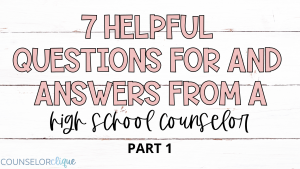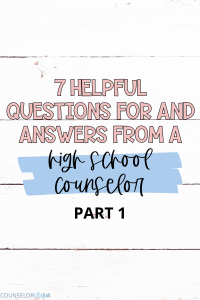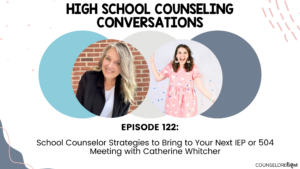I recently opened up a Q&A on my Instagram stories where followers asked questions about a “day in the life of a high school counselor.” I figured I’d do a round up of those questions and answers right here! Here is a summary of questions and answers to/from a high school counselor from other school counselors. This post covers a range of topics like college and career readiness, 504 plan organization, and the management of tough parents.
1- What are some of your favorite college and career ready resources?
To be honest, I create a lot of my own college and career activities and resources as I’ve seen a need to fill with my own students. As our school has used Naviance, we really took advantage of those college search tools and career assessments there. I like College Board’s college search called “Big Future.” I also encourage a lot of our district’s work-based learning and internship opportunities that they make available to students.
2- How do you partner with middle school counselors (for registration, etc.)?
Since our counseling team is divided by alphabet, we assign some big roles and tasks… like middle school counseling liaison, and that actually was not me. However, these are some of the things that that counselor/our department helps with:
- We host all of the middle school counselors from our main feeder schools for doughnuts and coffee and go through the registration timeline and talk through electives and describe certain classes for them. This helps bring clarity to anything they have questions about and make the registration process and transition smoother for everyone involved!
- I feel like I know our middle school counselors decently well (or at least 1 or 2 at each of our main feeder schools). I call them to ask questions about specific students they may have relationships with, families they have worked with, or just situational consulting.

3- How big is your caseload? Does it consist of ninth through twelfth graders?
Yes- ninth through twelfth graders! We have been alphabet for 2 years, and I’ve absolutely loved it. I feel like it’s the best of ALL worlds. (Read more about dividing caseloads here.) The adaptability is something I LOVE about this job and having the full range of grade levels gives me the opportunity to work with all different students, all different drama, and all different issues each day!
Depending on the year, my caseload with alpha has ranged from about 250-275. Some years have bigger senior groups than others. This past year, I only had 42 seniors! It was a dream! I got to work very closely with all of them and their families; I really felt like I knew them well!
4- How do you track or progress monitor your 504 students?
Since (like I said in the aforementioned question) we are organized by alphabet, my caseload stays relatively the same from year to year. If we are going to have to manage our own 504 plans for our own students, then this is the way to do it. It’s nice to already know the student, their general accommodations and diagnosis, and their families. This makes our annual meetings run smoothly because parents know who I am and what to expect. They’re also comfortable asking questions and requesting additional meetings or information as needed. I am comfortable with their plans and addressing questions from teachers because I know each of the students’ situations and educational histories. I keep a Google Sheet of all of my students, their grade level, their last 504 meeting, when we need to meet by for this year if it’s an annual review or 3-year re-evaluation, anything I need to make sure I remember to add in for the year (any special testing accommodations for SAT/ACT/state testing?), etc.
The BEST thing that has helped my sanity in tracking and managing 504 plans is having one of our clerks schedule my meetings for me. I make my Google Calendar public to her, so she can see when I’m available (this means I have to stay accountable to using my calendar which I do a decent job at). She checks my master spreadsheet for whose meetings need to be scheduled by what deadline, and she checks my calendar for my availability. She reaches out to the parent to invite them, she finds a teacher that the meeting time works with and invites them, and she invites the student on the day of. She even sends a reminder email to all parties involved as we get closer to the meeting. This was the part that was most tedious to me! I am so thankful it was something she offered to do and that it’s something she doesn’t mind doing! It helps me out SO MUCH!
5- What tips do you have for a first-year high school counselor with a caseload of 365?
Been there, done that, got the t-shirt! Another way we’ve done our caseloads in the past has been “rolling” with a class. I stayed with the same class for 3 years which meant I had a HUGE caseload, but I did know them and their families really well. By the time they graduated (which means this is the smallest their class ever was), there were 420 of them. I WILL SAY… the spring of this group’s senior year was THE MOST STRESSED I’ve ever been in my career as a school counselor, but it was the most rewarding. I’d say as a FIRST YEAR counselor in this situation, LEARN NAMES and INVEST IN RELATIONSHIPS.
Students notice when you remember their names or something about them. That was always the highest compliment that a student would mention to me… “how do you remember everyone’s names?” It was something I just really cared about because I knew it made a difference!
I’d also encourage you to BE VISIBLE in the halls, between class changes, and during lunches. A lot of times students remember they need to see you when they ACTUALLY see you in the school. They will know your face the more they see you around! Get some systems in place for how you function best… whether that’s file folders, spreadsheets on the computer, or a good calendar system… these can all go a long way!
6- Have you always been a high school counselor? Is high school where you’ve always wanted to be?
I’m one of the lucky ones who always knew high school was where I wanted to be! When I was in college, I worked at a summer camp each summer and always loved being with the older, high school aged girls. I was also a volunteer Young Life leader and spent a lot of time with high school students during my time in college and grad school. I also served for many years at my church with high school aged students. That was for sure where I felt most comfortable, and I felt very confident that I’d like to continue working in a capacity with high school students!
I did get internship experience at each level, and I would encourage graduate-level students to do this even if they are certain of the grade level they want to work with. My practicum experience was only 100 hours, and I did this in an elementary school (since this is where I could least see myself working). For my first internship, I was in a middle school for 300 hours; for my last internship, I spent 300 hours in a high school. I tried to get different internship experiences to broaden my scope of experiences and the students I worked with. I’m so glad I did! Each level was SO different! It’s hard to believe it’s the same job at each level!
7- What tips do you have for strategically and mentally dealing with parents who try to bully and blame?
I have definitely had my share of these experiences. To be honest, I’d say it’s one of the hardest parts of the job. My tips would be:
- Document everything: I always tried to have documentation with email, and I’d print it and save it if it’s something I felt like I may need to come back and reference.
- Always try to have a witness: If I had to have a meeting with these parents, I would do so in a conference room with a door open or my office with a door open, so others would pass by and see. I’d also let someone know I was going into a meeting with this person and to keep their ears open if it was getting hostile to help me out.
- Always have an administrator on your team: Know who you can trust and have an admin who knows the background of the parent/student/family. You will need someone to encourage you, to keep you sane, and to defend you when something goes above you.
- Don’t take it personally (easier said than done): These parents have caused me to lose sleep at night. It was nice having a supportive team and a supportive administrator who saw what was happening and reassured me that this person/these people did not dictate the type of school counselor I was. They did not define what the majority of other students/parents thought about me, and I was, indeed, helping the students on my caseload.
If you liked this question and answer session, be sure to check out Questions For and Answers From a High School Counselor: Part 2!
I hope these Q&As give some insight into life as a high school counselor. Sign up for my email list, and I’ll send you my “Responsibilities Matrix” Google Sheet Freebie which shows how we organize and divide up our yearly tasks in my department!






